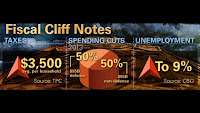Other housing-related provisions brought into effect with the new laws are:
- A 10% tax credit up to $500 for homeowners' energy improvements to an existing home, and is retroactive for 2012.
- Capital gains rates remain at 15% for incomes under $400,000 (individual) and $450,000 (joint); above those income levels gains will be taxed at 20%. On sale of principal residence, the gains rate remains at $250,000 (individual) and $500,000 (joint).
- An 2011 expired tax deduction for mortgage insurance premiums (MIP and PMI on loans) has been restored and is retroactive through 2012.
- The new "Pease Limitations", per California Association of Realtors, are at "$300,000 for married taxpayers filing jointly and $250,000 for single taxpayers (i.e., a married couple with an AGI of $400,000 would be $100,000 over the threshold; the couple’s deductions would be reduced by $3,000 which is 3% of $100,000). No matter how high a taxpayer's AGI, the Pease reduction cannot exceed 20 percent of the amount of itemized deductions otherwise allowable for the year." These were named after Ohio Congressman Don Pease and were first enacted in 1990.
- The first $5 million dollars in individual estates and $10 million for family estates are now exempt from the estate tax. After that, the rate will be 40%, up from 35%. The exemption amounts are indexed for inflation.
- More at http://www.toptennewhomecommunities.com/blog/fiscal-cliff-bill-addresses-some-key-housing-issues/

